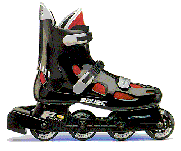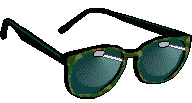

Skating Tips
Standing Still
with your feet in a "t" position, or with the back wheels touching in a "V" is comfortable and stable.Starting off
from the "T" position, lean forward over the front leg while pushing away with the rear leg, and beginning to glide.Coasting
for better balance, keep one foot slightly ahead of the other, with knees bent.Motion
with your weight on the left, push and extend the right leg out to the side, glide, then return skates together, transfer weight to the right leg, then push off to the side with your left leg.Stopping
(conventional brake)lower your body into a more seated position with skates parallel, not more than chest-width apart. Lean your chest forward and the brake skate ahead. Raise the toe and slowly apply pressure to the brake. Continue increasing pressure until you stop.Stopping
(Roces dual brake) lower your body into a more seated position with skates parallel, not more than chest-width apart. Lean your chest forward and transfer your body weight to the heel of braked skate. Slowly apply pressure to the brake. Continue increasing pressure until you stop.Street Sense
(skate with your head, not on it)![]() Develop
skating skills on flat terrain, not hills.
Develop
skating skills on flat terrain, not hills.
![]() Always
wear wrist guards, knee and elbow guards, and a helmet.
Always
wear wrist guards, knee and elbow guards, and a helmet.
![]() Avoid
skating hazards such as sticks, leaves, gravel, oil, soft tar, and wet spots.
Avoid
skating hazards such as sticks, leaves, gravel, oil, soft tar, and wet spots.
![]() If
a hazard is unavoidable, lower your center of gravity and coast straight
through with your weight balanced, or hop over the obstacle.
If
a hazard is unavoidable, lower your center of gravity and coast straight
through with your weight balanced, or hop over the obstacle.
![]() Skate
with traffic.
Skate
with traffic.
![]() Curbs-
come to a stop before stepping up or down.
Curbs-
come to a stop before stepping up or down.
![]() Use
caution-always look at the driver (not the car) to predict a car's path.
Use
caution-always look at the driver (not the car) to predict a car's path.
![]() Be
prepared for opening car doors.
Be
prepared for opening car doors.
![]() Wear
reflective gear in low light.
Wear
reflective gear in low light.
![]() Taxis
are unpredictable, give them room.
Taxis
are unpredictable, give them room.
![]() Avoid
sewer grates and manhole covers.
Avoid
sewer grates and manhole covers.
![]() Be
aware of traffic in front and behind, and be sure they are aware of you.
Be
aware of traffic in front and behind, and be sure they are aware of you.
![]() Recognize
you limits and skate within them!
Recognize
you limits and skate within them!
Inline Skates Safety Tips
![]() Learn
at least two effective stopping techniques.
Learn
at least two effective stopping techniques.
![]() Obey
traffic signs(as any other vehicle).
Obey
traffic signs(as any other vehicle).
![]() Skate
in single file.
Skate
in single file.
![]() Do
not stop on pathways. Move aside or out of the way.
Do
not stop on pathways. Move aside or out of the way.
![]() Alert
others when passing, i.e. "passing on your left".
Alert
others when passing, i.e. "passing on your left".
![]() Do
not weave on path.
Do
not weave on path.
![]() Do
not attempt to turn before checking traffic, both ways.
Do
not attempt to turn before checking traffic, both ways.
![]() In
a jam point to the direction you wish the other person to move.
In
a jam point to the direction you wish the other person to move.
